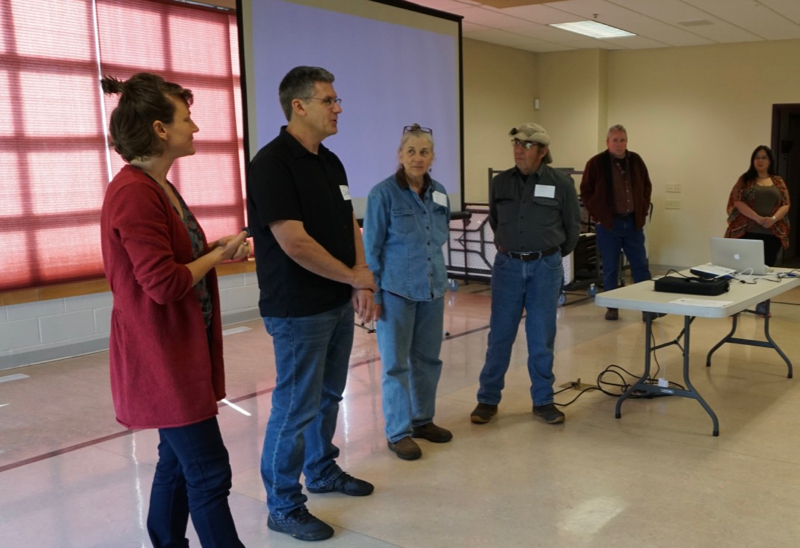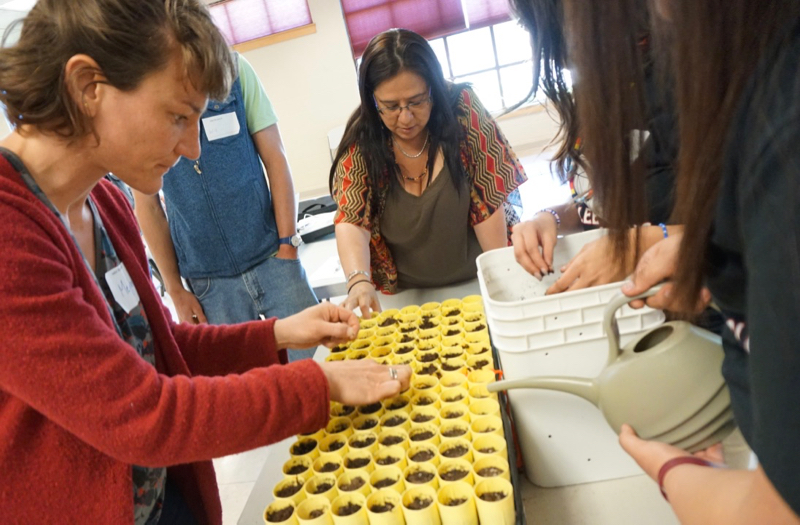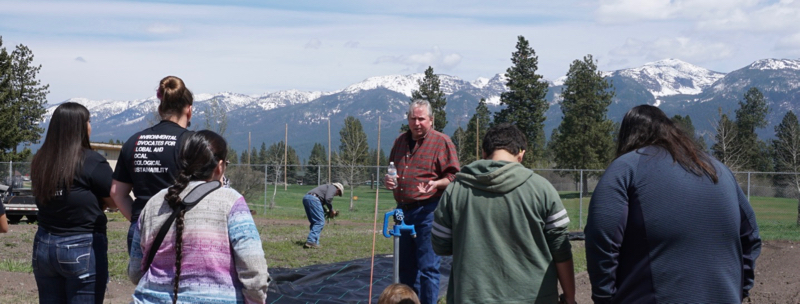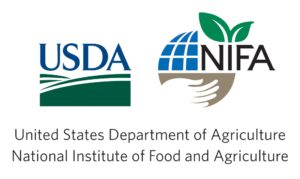NWAL holds Youth Day event at Salish Kootenai College
On a sunny Thursday morning in early May, twelve students from local high schools of the Confederated Salish and Kootenai Tribes of the Flathead Reservation in western Montana gathered in the fitness center cafeteria at Salish Kootenai College (SKC) for an event called “Youth Day.” The students were welcomed to the event by SKC president Dr. Sandra Boham.
“You really are going to be the next leaders in our communities,” Boham told them. “We need you. We need you here, and we need you in our future. I am always looking for who will be the next president of SKC, the next biology instructor, the next tribal attorney, the next principal for Polson School District. Who will be the next people run the dam and monitor the fish. It’s going to be you.”
Youth Day, a one-day event organized by researchers and educators from the Native Waters on Arid Lands (NWAL) project team, aimed to provide opportunities for meaningful dialogue and learning around the themes of climate change, adaptation, water and agriculture. The event agenda included an interactive “climate myths versus facts” session with NWAL education lead Meghan Collins; an outdoor dendrochronology lecture and tree-coring demo by Dr. Rick Everett, Professor of Forestry at SKC; a hands-on planting activity in a native plant restoration site on campus with SKC Extension Director Virgil Dupuis, and more.

NWAL team members Meghan Collins, Derek Kauneckis, Anna Eichner, Scott Goode, Virgil Dupuis (SKC) and Mary Rose Morigeu (Confederated Salish and Kootenai Tribes) welcome participants to Youth Day, May 3, 2018.
“The discussion topics stemmed directly from the core themes of NWAL as a project – food, water and climate,” Collins explained. “We also worked really closely with SKC extension agent Virgil Dupuis to set up an agenda that we thought would be meaningful for the students and would resonate with their activities and future goals.”
The idea for this event was sparked via feedback from participants at NWAL’s Tribal Summit. The Tribal Summit is an annual event that gathers members from tribes across the western U.S. for two days of talks, workshops and two-way dialogue about issues on reservations and tribal lands related to climate change, agriculture, ranching, water resources, economics, and other topics of interest.
“Feedback from the Tribal Summit said, over and over again, that we cannot be talking about issues of climate without engaging our youth,” Collins said.
As such, Youth Day was designed not only as an opportunity for the NWAL team to teach the students, but to learn from them as well.
In the early afternoon, a group of five students from the Arlee EAGLES club – a student-run environmental advocacy club from Arlee High School located on the Flathead Reservation – stood before the group, teaching event attendees how to plant seeds of native Chokecherry and Twinberry in long, yellow, tube-shaped pots.

Meghan Collins (NWAL Education Lead) and Mary Rose Morigeau (Confederated Salish and Kootenai Tribes) learn native seed planting techniques from students from the Arlee EAGLES Club at NWAL Youth Day, Salish Kootenai College. May 3, 2018.
A shallow hole for the seed, a sprinkle of peat moss on top, and a little water, the Arlee students explained, as youth from other nearby schools of the Flathead Reservation, other tribal members, and members of the NWAL team circled around to try for themselves.
The Arlee students also presented an array of environmental projects that they had undertaken at their school, including a school-wide recycling program, a greenhouse, and an impressive effort to monitor emissions generated by their school’s coal-powered heating system. The students hope to use the emissions data to convince their local school board to change energy generation at their school to a cleaner and more sustainable system.
Youth Day concluded with a discussion and presentation by NWAL team member Scott Goode on a new approach for in-ground composting and sustainable gardening that also helps sequester carbon from the atmosphere, and a visit to the SKC vegetable garden plot.
“I really enjoyed learning about the composting system,” said Margaret Sansavere, a junior at Arlee High School and member of the Arlee EAGLES club. “I never thought about putting in-ground trenches of compost into a garden. It really inspired me to try to get my peers involved and changed my perspective on gardening.”
Youth Day at SKC was the second ‘Youth Day’ event hosted by the NWAL project; the first was held at the Desert Research Institute in Reno, Nev. in November 2017. Both events provided valuable opportunities for sharing knowledge and ideas across generations.
“This was a fantastic day of two-way dialogue,” Collins said. “The students really inspired our faculty and experts, and I hope that the students also came away with some new ideas for the projects that they are taking on at home.”
Additional NWAL Youth Day events are planned with Native students from Paiute and Shoshone Tribes in Nevada and Navajo Nation, Hopi and other Pueblo communities in Arizona and New Mexico.





Trackbacks & Pingbacks
dissertation proofreading help https://helpon-doctoral-dissertations.net/
edd dissertation topics https://dissertations-writing.org/
law dissertation writing services https://mydissertationwritinghelp.com/
writing a dissertation in a day https://dissertationwriting-service.com/
real casino free slots https://slotmachinegameinfo.com/
free casino slots online https://www-slotmachines.com/
wizard of oz slots zynga https://411slotmachine.com/
dancing drums free slots https://download-slot-machines.com/
10000 slots youtube https://beat-slot-machines.com/
ceasars slots https://slot-machine-sale.com/
free triple diamond slots https://slotmachinesforum.net/
casino slots with bonus https://slotmachinesworld.com/
play free slots for fun https://candylandslotmachine.com/
456 free slots casino https://freeonlneslotmachine.com/
popular gay dating apps https://speedgaydate.com/
free bi gay chat sites seattle wa https://gay-buddies.com/
gay chat video https://gaytgpost.com/
gay autism dating vancouver washington https://gaypridee.com/
gay incest chat https://bjsgaychatroom.info/
2trigonometry
Comments are closed.